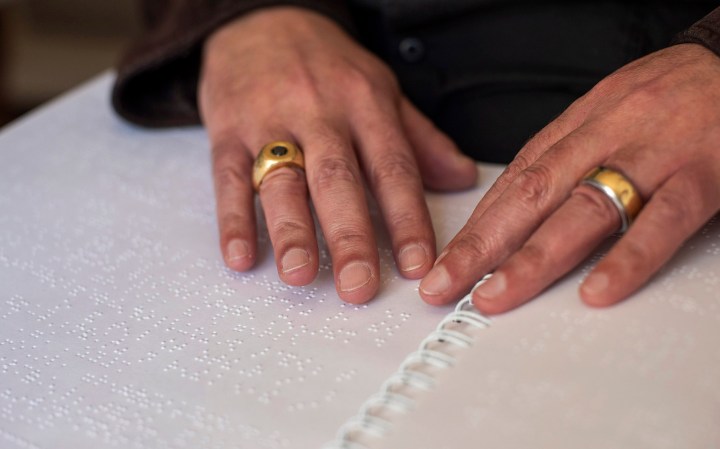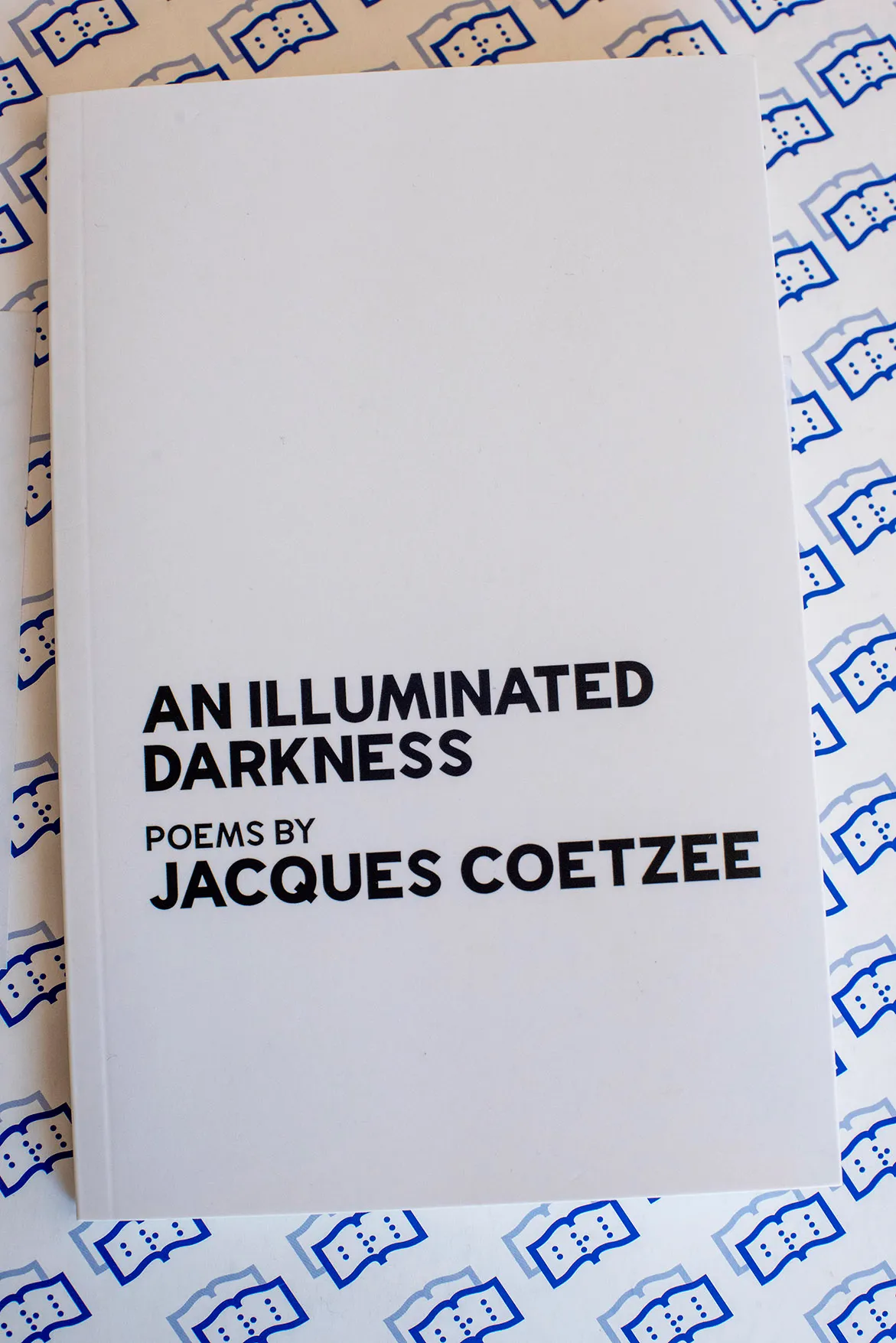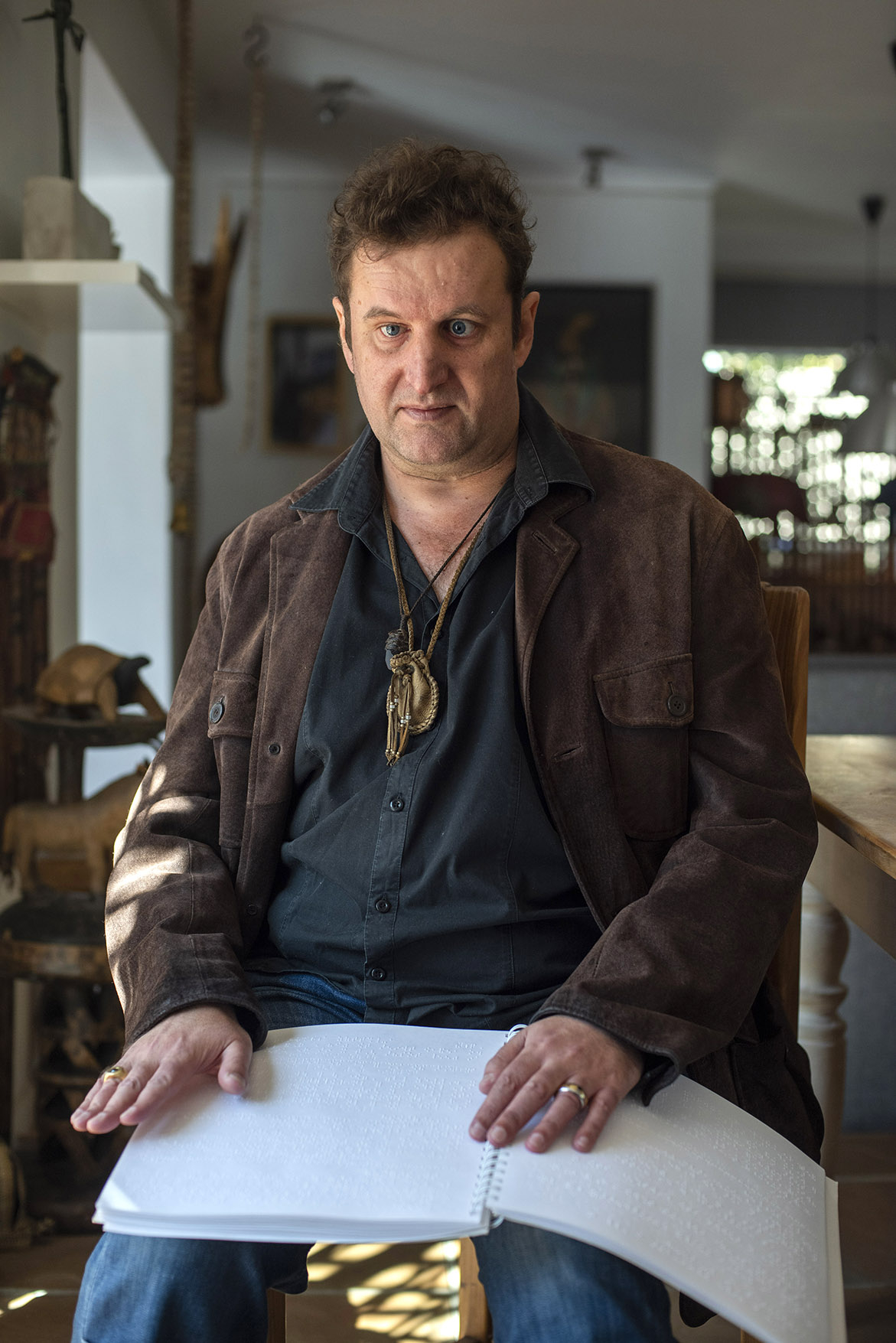AN ILLUMINATED DARKNESS
Ingrid Jonker Prize winner Jacques Coetzee on political awakening, blindness, poetry and music

Coetzee has been writing poetry and singing since he was a child, spurred on by his mother’s readings to the family of action-driven narrative poems and by his two older sisters’ enthusiasm about reading to him. He has won the 2022 Ingrid Jonker Prize for poetry.
When Jacques Coetzee’s debut book of poetry was selected for publication in 2020, his publisher diplomatically suggested that the book was partly about disability too, a fact that should be mentioned in marketing materials.
“Ten, 15 years ago, I would have been irritated if people spoke about my work in relation to disability. But by the time the book came out, it was fine. It’s important that the book is in Braille and I’m happy that there is a copy of the book in Braille at the school I went to. That means something,” Coetzee said in an interview after hearing on Monday, 18 July 2022, that he’d won the 2022 Ingrid Jonker Prize for a debut poetry collection written in English.
Apart from the usual print run, 25 books were published in Braille so that every school for the blind and library for the print-disabled in South Africa would have one. The book was also made available in large-text format, and Coetzee recorded an audiobook, which is available for free on the publisher’s website.
The book, An Illuminated Darkness, takes its title from one of the poems it contains, The Steps, which is about going to a school for blind children, and it was chosen, Coetzee said, because it was a good metaphor for what he does.
“It’s about darkness you have to fill by creating meaning, but also, obviously, darkness because I can’t see. Because I am blind. And to illuminate that. To make it sing.”

A print copy of Jacques Coetzee’s Ingrid Jonker Prize-winning collection of poems, ‘An Illuminated Darkness’, 21 July 2022. Image: David Harrison
Coetzee (49) has been writing poetry and singing since he was a child, spurred on by his mother’s readings to the family of action-driven narrative poems and by his two older sisters’ enthusiasm about reading to him.
His is a well-known face on the poetry scene in Cape Town and his steady, mellifluous readings of his poems are familiar from public open mics, especially at Off The Wall, which was started and run by Hugh Hodge for several decades. He also runs, with Ed Burle, Nondwe Mpuma, Lisa Julies and Melissa Sussens, The Red Wheelbarrow poetry sessions.
Voice is not only a theme in his poetry, but in his life, and it is no surprise that in fallow moments, even while receiving guests, Coetzee sings and hums as he walks from room to room in the house he shares with his wife, the artist, sculptor and writer Barbara Fairhead, his constant collaborator since they met in 2005. Together they wrote a book of poems called The Love Sheet (Hands-On Books, 2017).
One of the judges in this year’s competition noted that “the poet writes with a musician’s ear and a heart’s depth of listening that consciously unfolds the lines of the poems, particularly the shifts in rhythm”.
Coetzee is also a musician, with five albums with his band Red Earth and Rust to his name, and he says that reading his poetry aloud and singing give him similar feelings of being anchored in the world.
The anchors might have been necessary, because Coetzee harbours a rebelliousness that seems to both stem from and is limited by his sightlessness. His life in the small, conservative Afrikaans town of Worcester in the Western Cape was one he wanted desperately to escape, so he went to study English and philosophy and later towards a master’s degree in creative writing under the late South African poet Stephen Watson.
“I loved books and poetry for their own sake, but I was partly also defending against being blind.”
An Illuminated Darkness was published by the poetry press uHlanga, which also published other Ingrid Jonker winners, Thabo Jijana and Saaleha Idrees Bamjee, as well as Glenna Luschei Prize for African Poetry winners Koleka Putuma and Maneo Mohale.
Publisher Nick Mulgrew said: “When I sit down to assess a manuscript for publication, I hope to have my sense of the world altered. Jacques’s poetry does that immediately, both intentionally and innately.
“So much of how sighted people describe poetry and poetics is through visual metaphor – point of view, perspective, optic – and here is a poet who cannot rely on that. Jacques instead relies on musicality, rhythm, changes of pace, and taking careful control over both narrative and his own emotions. Few people can write about being prayed over by random Christians with such grace and humour, returning the gaze, so to speak, and claiming one’s own life and experience for oneself.”
Mulgrew said his desire to print Coetzee’s book in Braille was partially driven by his discomfort in producing a book that its author couldn’t read, but also by a lack of local books in Braille that could be read for pleasure. Most books available in Braille are textbooks.

Ingrid Jonker Prize winner Jacques Coetzee reads from a Braille copy of his collection of poems, ‘An Illuminated Darkness’, at his Cape Town home, 21 July 2022. Image: David Harrison
Coetzee said Mulgrew had changed the landscape of poetry in South Africa. “He manages to be political in a way that is quite unobtrusive, and which feels very real. Nick is the reason it feels exciting to be writing in South Africa now.”
Turning to his own understanding of how his writing is political, Coetzee said it was a slow awakening.
“When I was 15, I was reading a lot of Breyten Breytenbach and I would always put colours into my poems. I was writing under his influence and colours had symbolic meanings and, of course, I thought my readers would be sighted, right?
“It was quite a political thing to slowly realise I had to write as a blind person. When I started, I was trying to write myself away from blindness into a place where I had something to say. Blindness, for me, was this rather boring external detail. Slowly I realised I had to write about what I knew. In other words, about blindness.
“I would have to confront it, to write myself into it and make sense of it, because it wasn’t going to go away. [Disability] makes you feel helpless, and you want to not feel helpless and to seem like you really know something about something other than your disability.
“But it was only after I submitted the manuscript to uHlanga that I was ready to take on board that, because I am blind, I have a different take that is fresh, that is new.
“One of the ways in which ableism works is that people say, ‘You’re so wonderful!’ and in that moment you stand for all blind people, or all disabled people. People project things onto you. The knee-jerk reaction to that is, ‘no, I’m me’.
“Now I understand how important this book is. It’s wonderful that Nick decided to publish me. I’m glad that this thing has come into the world through me.”
***
Dusk Poem
Then there were the two American tourists
(a man and his girl, I think they must have been)
who wanted to pray for me at dusk.
I pretended not to understand,
(“Why me? Why not for someone else?”)
but I was too obvious a candidate
to pass over in prayer, and they
emboldened by strange surroundings,
by their faith in miracles.
I sighed; I wanted none of it.
But they were sweet, insistent,
and my guide dog and I
had only just learned to walk to that restaurant.
It would be a diversion, after all.
I was hungry to slip beneath
the surface of this moment –
anything to be a citizen
here, in this private place.
And so I let the man pray
while the girl, soft-voiced and shy, deferred;
let them pray for the return of my sight
and immediately regretted it:
the young man’s voice loud, authoritative,
desperate somehow, vulnerable.
I had done an improper thing,
willing them to believe themselves
into a corner, whether they knew it or not.
Walking away afterwards
I imagined them settling down for the night,
with desire perhaps unspoken, forbidden between them.
I thought of the cost of such refusals;
felt the old, familiar restlessness
that still sets me on my way through nights like these –
looking, looking past dawn for one more taste
of this incorrigible life,
so that one day I can say:
“I gave myself to this messy world
and tried to love it long after
I’d given up trying to change it.
No better than I should be, I didn’t
stand apart. In the end
I redeemed myself: I wasn’t a tourist.” DM/ ML
In case you missed it, also read Touchy-feely: Emotion isn’t just in fashion — it may be the new path to success
Touchy-feely: Emotion isn’t just in fashion — it may be the new path to success

















Comments - Please login in order to comment.